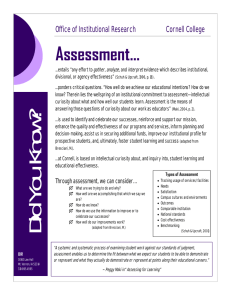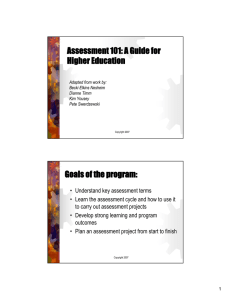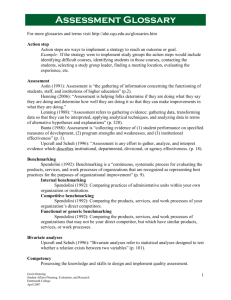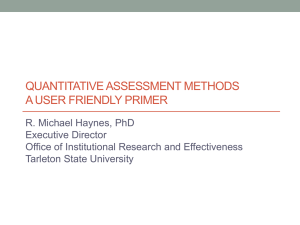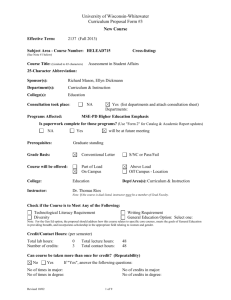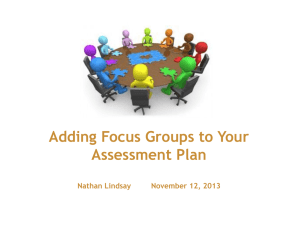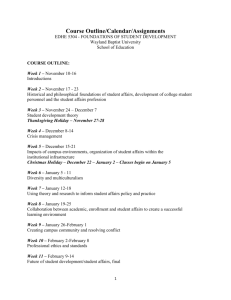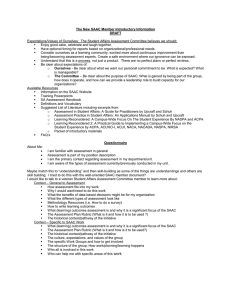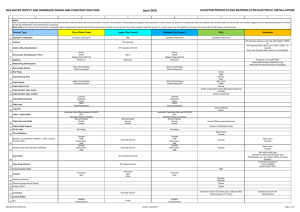Systematic Inquiry… Good Practice in Higher Education g 6/24/2008
advertisement
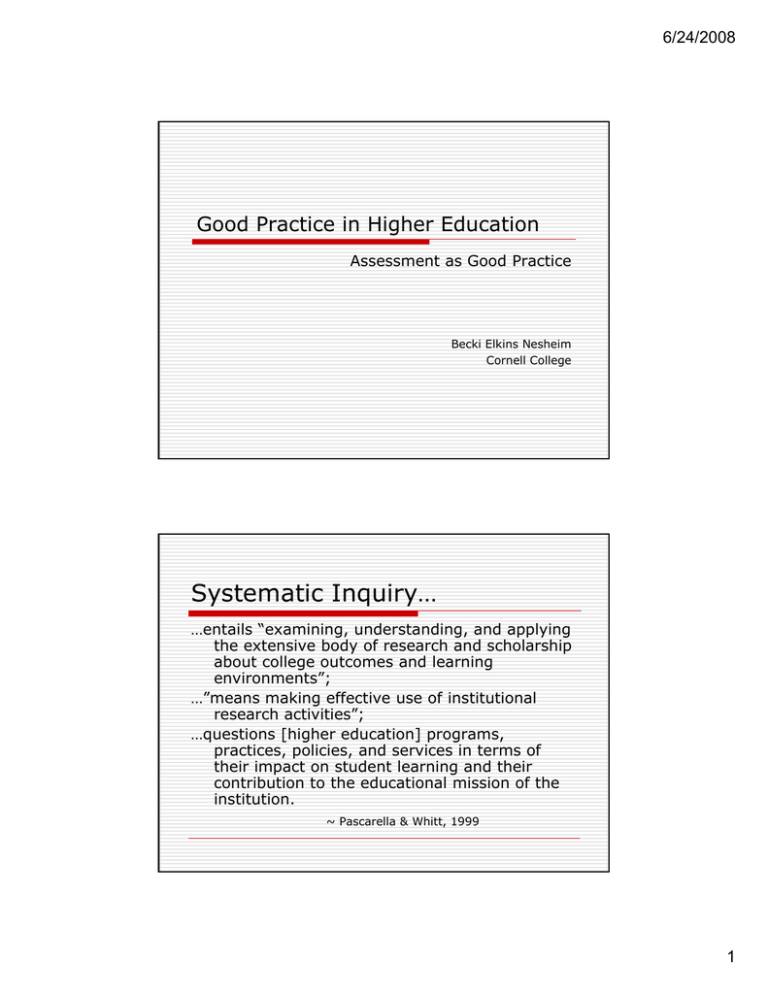
6/24/2008 Good Practice in Higher g Education Assessment as Good Practice Becki Elkins Nesheim Cornell College Systematic Inquiry… …entails “examining, understanding, and applying the extensive body of research and scholarship about college outcomes and learning environments”; …”means making effective use of institutional research activities”; …questions [higher education] programs, practices, policies, and services in terms of their impact on student learning and their contribution to the educational mission of the institution. ~ Pascarella & Whitt, 1999 1 6/24/2008 What is assessment? “Assessment is any effort to gather, analyze, and interpret evidence which describes institutional, divisional, or agency effectiveness.” ~ Schuh & Upcraft, 1996, p.18 What is assessment? “How How well do we achieve our educational intentions? How do we know? Therein lies the wellspring of an institutional commitment to assessment - intellectual curiosity about what and how well our students learn. Assessment is the means of answering i th those questions ti off curiosity i it about our work as educators.” ~ Maki, 2004, p. 2 2 6/24/2008 What is assessment? “…the systematic collection of information about student learning, using the time, knowledge, expertise, and resources available, in order to inform decisions about how to improve student learning.” ~ Walvoord, 2004 Why assessment? Survival Strategic planning Policy development and decisionmaking Quality Affordability Aff d bilit / cost-effectiveness t ff ti ~ Schuh & Upcraft, 2001 3 6/24/2008 Purposes of Assessment What are we trying y g to do and why? y How well are we accomplishing that which we say we are? How do we know? How do we use the information to improve p o e or o to celebrate ce eb ate our ou successes? How well do our improvements work? ~ adapted from Bresciani, M.J. Types of Assessment Schuh & Upcraft, 2001 Tracking g usage g Needs Satisfaction Campus cultures and environments Outcomes Comparable institution National standards Cost effectiveness 4 6/24/2008 Steps for Assessment Planning adapted from Schuh & Upcraft, 2001 1. What circumstances are driving g our assessment? § opportunities / concerns / pressures 2. Who are the stakeholders in this project? 3. What is the purpose of our assessment? 4. What needs / experiences / outcomes are we interested in studying? Steps for Assessment Planning adapted from Schuh & Upcraft, 2001 5. What approach(es) pp ( ) best meets our assessment needs? § § What information do we need? What is the best way to get that information? 6. What assessment tools / protocols will best meet our needs? 7. Who is our population for the assessment? How will we identify our sample? 5 6/24/2008 Steps for Assessment Planning adapted from Schuh & Upcraft, 2001 8 8. How will we collect our data? 9. How will we analyze our data? 10. How will we evaluate the results for policy and practice implications? Other implications? 11. How will we effectively report / use the results? 6 6/24/2008 Lessons Learned Don Don’tt fly solo! Build bridges to collaboration. Find out what efforts are already in place. Talk it up! Institutional mission and educational outcomes are foundational. Start somewhere. somewhere Less is sometimes more. Lessons Learned Follow the “good enough” rule. There’s no substitute for good data. Acknowledge the limitations. Projects must be feasible and useful. Close the loop! Data collection is not assessment. Analysis A l i d does nott have h to t be b complex. l Share the results and discuss the implications. 7 6/24/2008 Lessons Learned Bad news, good news. Celebrate successes. Highlight areas for improvement. All assessment is political. Never N compromise i ethical thi l standards. t d d In closing… “To improve learning and promote learning communities, we must recognize that successful assessment is not primarily a question of technical skill, but rather one of human will.” ~ Angelo, 1999 8 6/24/2008 Resources American College Personnel Association and National Association of Student Personnel Administrators. Administrators (2004) (2004). Learning reconsidered: A campus-wide campus wide focus on the student experience. Washington, D.C.: Authors. Banta, T.W., Lund, J.P., Black, K.E., & Oblander, F.W. (1996). Assessment in practice: Putting principles to work on college campuses. San Francisco: Jossey-Bass. Council for the Advancement of Standards in Higher Education (CAS), (2006). Frameworks for assessing learning and development outcomes. Washington, D.C.: Author. Kuh, G.D., Kinzie, J., Schuh, J.H., & Whitt, E.J. (2005). Assessing conditions to enhance educational effectiveness: The inventory for student engagement and success. success San Francisco: Jossey Jossey-Bass Bass. Maki, P.L. (2004). Assessing for learning: Building a sustainable commitment across the institution. Sterling, VA: Stylus. Walvoord, B.E. (2004). Assessment clear and simple: A practical guide for institutions, departments, and general education. San Francisco: JosseyBass. 9
